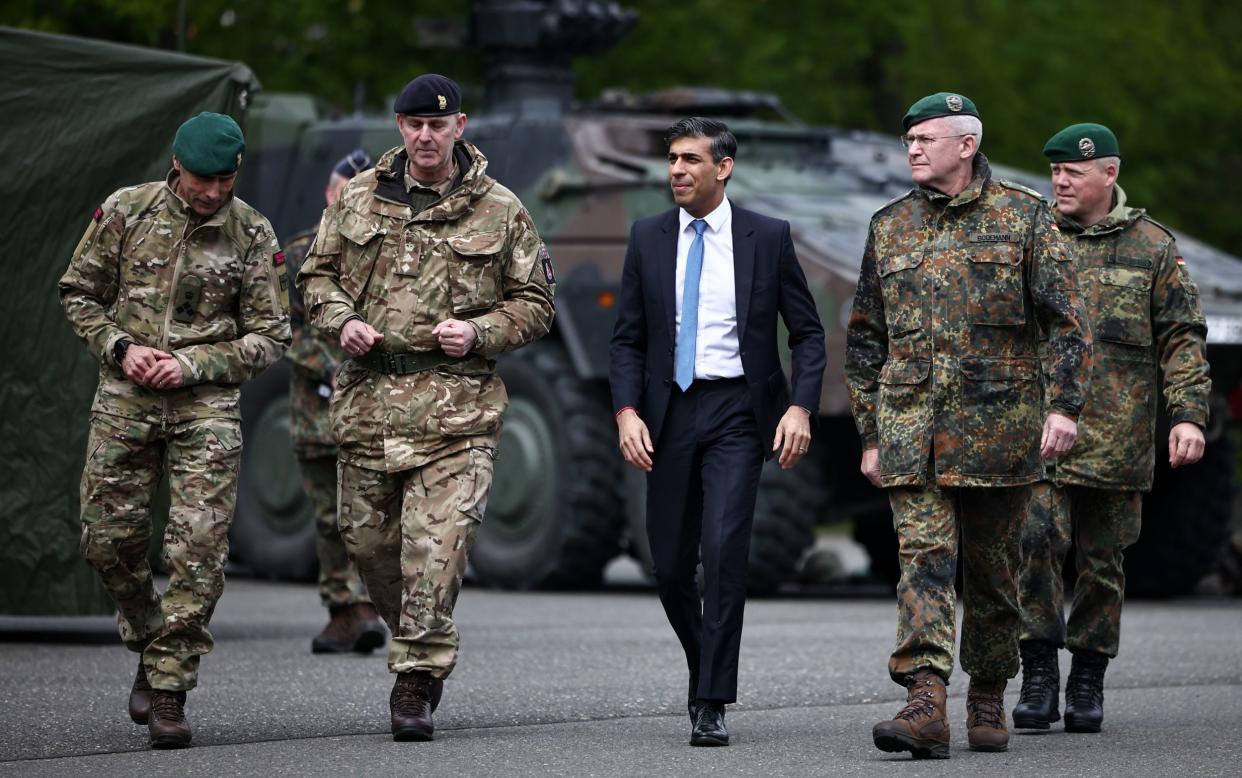There’s a dangerous hole in Britain’s defence plans

- Oops!Something went wrong.Please try again later.
As someone who has argued for a decade or more that the Government must increase defence spending significantly to tackle mounting global threats, it might seem churlish to question the impact the extra funding Rishi Sunak has announced will have on the effectiveness of our Armed Forces.
The sums pledged, after all, represent the biggest rise in defence spending since the end of the Cold War, amounting to an extra £75 billion, which should mean that Britain’s defence budget hits 2.5 per cent of GDP by the end of the decade. This ought to, as Sunak stated when making the announcement during a visit to Poland this week, make the UK “the largest defence power in Europe”.
There is much to applaud, too, in the Government’s ambition to increase domestic weapons production. Years of cuts to the defence budget have not only resulted in the hollowing out of all three Services: they have also seen vital equipment-making facilities either mothballed or closed altogether.
The fact that we have struggled to provide Ukraine with sufficient quantities of artillery shells – a basic requirement for any ground offensive – shows just how much our weapons manufacturing infrastructure had been run down. Rebuilding the industry is vital if Britain, together with its European allies, is to develop the means of defending itself against rogue states, such as Russia.
In this context, Sunak’s announcement yesterday, following his meeting with German Chancellor Olaf Scholz in Berlin, that Britain and Germany are to establish a new partnership to produce artillery shells, as well as deepening cooperation on other bilateral defence operations, is a welcome development.
At the very least, working with the Germans might help to instil a degree of efficiency and productivity to our woeful record on defence procurement.
Even so, questions remain about just how much impact this extra funding will have on the military’s preparedness to deal with future challenges, not least over how the Government expects to find the additional cash. Sunak and the Chancellor, Jeremy Hunt, say that some of the money will come from reducing the size of the Civil Service to pre-pandemic staffing levels, a feat that is easier said than done.
The pledge is reminiscent of a similar commitment made by former chancellor George Osborne, who, in his measly attempt to maintain defence spending at 2 per cent of GDP, claimed his proposed increase in funding would be sustained by the military making “efficiency savings”. No such savings were forthcoming, and defence spending suffered as a consequence.
Of even more concern is the absence of any mention in Sunak’s announcement of increasing the military’s fighting strength. It is all very well the Government announcing that it is investing more in weapons production, but they will not be of much use if there is no one to fire them.
For one of the more troubling consequences of recent defence cuts is that all three Services have suffered drastic reductions to their manpower, which is having a deleterious impact on their operational effectiveness.
No one with any working knowledge of the Army believes the Government’s insistence that, if push came to shove, Britain could still deploy and sustain a war-fighting division – a basic requirement for maintaining our status as a Tier One fighting force. Cuts to the Royal Navy’s staffing levels mean that it is unable to crew both of its new Queen Elizabeth-class aircraft carriers, while the Royal Air Force is suffering from a shortage of trained pilots because of budget-induced reductions to its core training programmes.
If Sunak believes that, with his promised extra funding, he is putting Britain on what he calls “a war footing”, he needs to understand that the country must also have the ability to conduct proper war fighting.
A good example of the military’s current limitations was provided when British forces supported the US in attacking Yemen’s Houthi rebels, who were attempting to disrupt shipping in the Red Sea with constant drone and missile attacks. While the US conducted its operations from the aircraft carrier battle group deployed in the area, Britain had to rely on RAF Typhoons flying a 2,000-mile round trip from Cyprus because neither of the Navy’s aircraft carriers were manned and equipped to carry out such operations.
If Sunak is serious about making Britain Europe’s most powerful military force, then the Government needs to invest as much energy in rebuilding the fighting strength of our Armed Forces, which means investing in a dramatic increase in recruitment.
Many of the cuts imposed on the Forces have been implemented as a result of the 2021 Integrated Review on national security. Since then, the threat environment has changed dramatically, to the extent that the British military has been involved in conflicts as far afield as Ukraine, Yemen and Iran.
For Sunak’s extra defence funding to have the desired effect, a new defence review is urgently required to ensure that the military is properly manned and equipped for the challenges that lie ahead.

